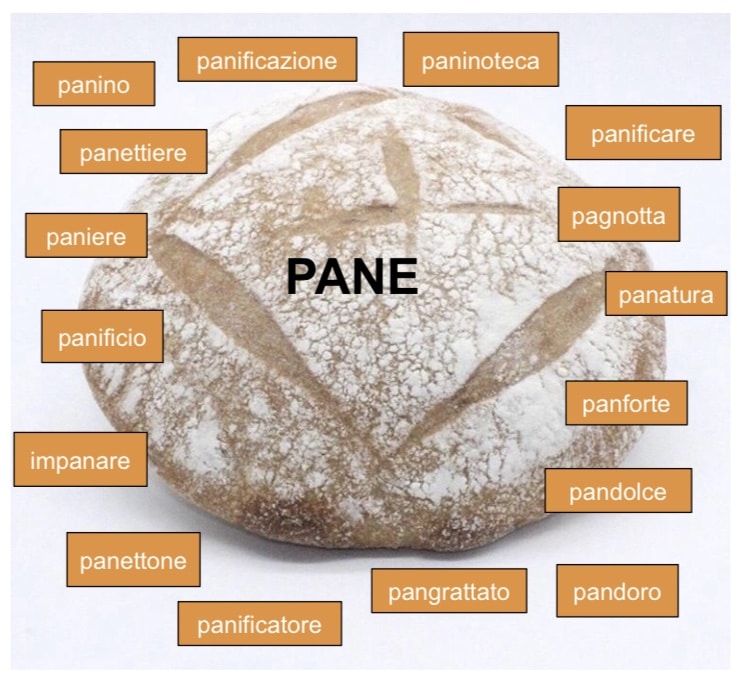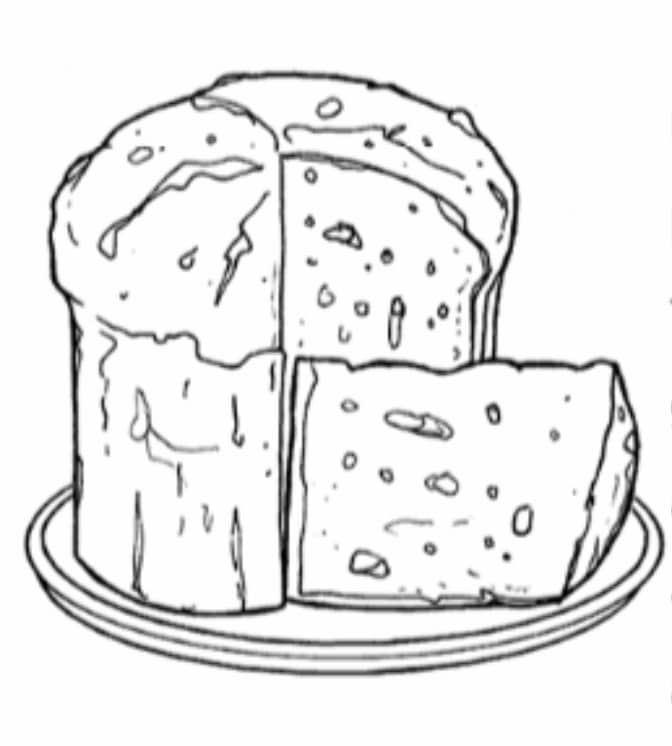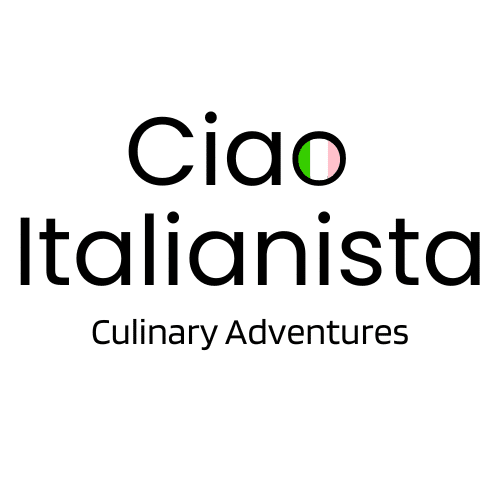Ciao Italianista contains affiliate links and is a member of the Amazon Services LLS Associates Program. If you make a purchase using one of these Amazon links, I may receive compensation at no extra charge to you. See my disclosure policy for more information.
Derivatives of Pane and Expressions with Pane
Do you love etymology or the study of words? Do you love starting with one Italian word and seeing how many more related words there are? Do you love learning new detti italiani (Italian sayings)?
Inspired from learning about and making pane pugliese, let’s start with the word Pane. Andiamo…
Definition of Pane
Il pane — singular, masculine noun;
La pagnotta — singular feminine noun.
Both il pane and la pagnotta mean bread. Figuratively pane means sustenance, nutrition, food; and pagnotta means your paycheck.
Etymology of Pane
One idea is that the word pane comes from the Sanskrit root pa which means to drink or more generally to nourish. Pasto (meal) also comes from this root. The first food of humans is the maternal milk, a liquid pasto. The importance and centrality of milk were probably also attributed to pane which is another essential and fundamental food. Another possibility is that pane comes from the root pa meaning to protect like in padre. Whether pane comes from the first or the second meaning of pa, both impart the meaning of sacredness to the word pane.
Derivatives of Pane and Related Words

- Panino — sandwich (-ino means little so panino is little bread)
- Panettiera — baker
- Panificio — bakery
- Panettone – panettone, a type of holiday bread (-one means big, so panettone is big bread)
- panificatore — baker
- Panificazione — bread making
- Panificare — the planning
- Pangrattato — bread crumbs
- Panforte — a chewy Italian dessert with nuts and fruits
- Pandolce — an Italian sweetbread
- Pandoro — a traditional holiday sweetbread
- Panatura — breading (like breaded chicken)
- Pagnotta — loaf
- Impanare — to bread
- Impanato — breaded
- paniere — basket
- paninoteca — sandwich shop

Panettone versus Pandoro
At the Italian immersion school I used to work at, Panettoni and pandori would magically start appearing on the lunch table around Christmas time and Easter. Inevitably my exuberant Italian colleagues would start debating which is better. In fact, this is an age-old debate that Italians love having every year. A quick search will pull up many articles on this subject like this one and go into great detail about the origins and actual differences. But since I am writing in my language corner, let’s first look at the differences in the words.
Panettone – singular masculine noun with a suffix meaning big (-one). So panettone literally means big bread.
Pand’oro — singular masculine contracted noun meaning bread of gold.
Panettone originates from Milan. It is a sweet dome-shaped Christmas cake filled with raisins and candied fruits. It is a yeast bread and goes through several risings. Pandoro comes from Verona. It is usually a star-shaped Christmas cake dusted with powdered sugar. Pandoro is also a yeast bread and goes through several risings. Both panettone and pandoro have interesting legends attached to them explaining their origins. You can read about these legends in this article here. Last year in my class, a boy and his father acted out this version of the legend for children:

From then on ‘Pan di Toni’ or better Panettone, was never missing from the Christmas dinner.
La Leggenda Del Panettone
Mentre tutto il personale di cucina era impegnato a servire in tavola le numerose portate del cenone di Natale, a sorvegliare il forno era rimasto solo Toni, il servo più giovane e pasticcione, che aveva appena 12 anni.
“Bada alle focacce che stanno cuocendo,” gli aveva raccomandato Abrogione.
Ma Toni, up po’ per la stanchezza, un po’ per il piacevole calore che il forno emaneva, si appisolò. Dormì soltanto pochi minuti, ma quando si svegliò, dal forno usciva già una densa nube di fumo.
“Povero me, che disastro,” si disperò Toni, strappandosi i capelli dalla testa. Che fare adesso? Come rimediare? Per fortuna sul balcone di legno era rimasto un po’ di pasta di pane. Senza perdere un istante, Toni afferò la pasta, la lavorò, vi mescolò uova e burro. Poi l’addolcì con il miele, vi unì passa e la frutta secca. Infine mise tutto nel forno.
“Dove sono le foccacce?” risuonò a un tratto la voce di Amrogione.
“Sono tutte bruciate,” rispuose Toni, “ma potremmo servire questo dolce che ho appena preparato.
Ambrogione fece buon viso a cattivo gioco e portò il dolce improvvisato da Toni sulla tavola dei signori di Milano, che lo aprressarono molto. Da allora, il “pan di Toni”, o meglio il panettone, non mancò mai nel loro cenone natalizio. Il panettone si è conquistato un posto nel cuore di tutti i golosoni del mondo. Essi dicono che diventa particolarmente buono se lo si gusta in compagnia.
Expressions Using Pane
Bread to Italians is like water to fish. Bread is essential for the Italian’s well being. It is served at every meal. And every meal is traditionally shared by the family which provides the emotional and physical sustenance for the individual. With bread holding such an important place in Italian life, the word pane naturally enters the metaphorical language of Italian expressions.
Understanding expressions in another language takes you to a whole new level of language comprehension. Expressions are sayings that native language speakers understand immediately but often don’t know the literal sense or the origin of the expression. Or they might be regional and so even a native speaker might not understand the sense of the expression even though they understand perfectly the words. They are often very hard to translate. This is because they usually rhyme and so don’t really make sense if you just translate them word for word. Half of the fun of them is in the rhyme. There are so many Italian expressions about bread. I found some that were already translated with an equivalent English expression. But for fun, I also took my hand at trying to figure out many more.
- Buono come il pane — As good as bread (a great guy, has a heart of gold).
- Se non è zuppa, è pan bagnato — If it isn’t soup, it’s moist bread (six of one, half a dozen of the other).
- Pane perso — Lost bread (a lost man, homeless).
- Senza il pane tutto diventa orfano — Without bread, everyone is an orphan.
- I miei parenti son i soldi in tasca e il pane nella casa — My family is money in my pocket and bread at home.
- Non è pane per i suoi denti — It isn’t bread for his teeth (it is above his capacities).
- Trovare pane per i propri denti — To find bread for one’s teeth (to find a tough adversary or obstacle).
- Rendere pan per focaccia — To give bread for focaccia (tit for tat).
- Dire pane al pane e vino al vino — To call bread bread and wine wine (to call a spade a spade; to speak with clarity).
- Nutrisi a pan bianco — To eat white bread all the time (to live on easy street).
- Distinguere pane dai sassi — To know the difference between bread and rocks (to know what’s up).
- Assai mane fan presto il pane — Many hands make the bread done soon (many hands make light work).
- Chi accumula e altro ben non fa, sparagna il pane e all’inferno va — He who accumulates and does nothing else, saves the bread and goes to hell (All work and no play makes Johnny a dull boy).
- A Roma ci vogliono tre cose: pane, panni e pazienza — In Rome you need three things: bread, clothes and patience.
- A fame pane, a sete acqua, a sonno panca — Bread for hunger, water for thirst, the bench for sleep (for real needs, you need very little).
- A mezzo gennaio, mezzo pane e mezzo pagliao — In mid January, half bread and half straw (Harvest is a long way off and resources are dwindling so you have to save half of your flour for bread and half of your straw for the animals).
- Ai ragazzi pane e scarpe — To the boys, bread and shoes (Young people fill up on food and then off they go).
- Sotto la neve pane e sotto l’acqua fame — Under the snow, bread and under water, hunger (This is the wisdom of farmers that know that if there is snow it will later produce good crops, but if it just rains, the crops will fail).
The list of Italian expressions about bread goes on and on. I printed out 60 expressions and tried to figure them out. This is a very good language exercise and will test not only your understanding of Italian but also your memory of equivalent English ones. Here are a few for you to try. First, translate it and then ask yourself what could this possibly mean? Then send me your translations and interpretations!
- Il pane degli altri e sempre duro.
- Pane di sudore ha gran sapore.
- Quando si ha fame il pane sa di carne.

